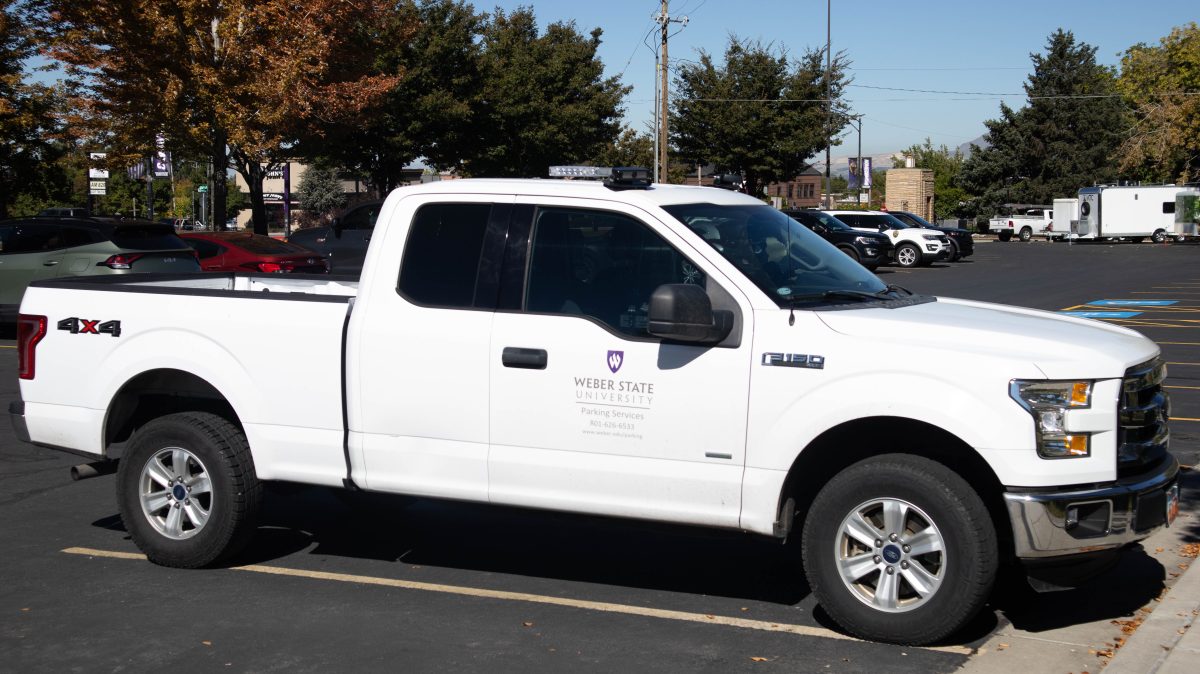Many Weber State University students have dealt with a ticket or two in their time on campus. Some have even dealt with a boot because of overdue tickets.
WSU conducted a commuter survey to estimate the carbon emissions from WSU commuting activities. The survey highlighted that 82% of faculty and staff drive alone to campus mainly for the freedom to come and go as needed from campus and that it saves time, with this comes the issue of parking permits and tickets.
The common challenges mentioned by the participating commuters were parking difficulties, the cost of parking and the distance to parking areas. The top five reasons why people have gotten a parking ticket are: their plate was not active on their permit, they parked in the wrong lot, their plate was not registered, their plate was not visible from the roadway and they had no active parking permit.
“There are not systematic issues, but there is a small percentage of human error both on the part of the person registering the vehicle and/or the enforcement officer making an error in the entry,” Crystal Taylor, manager of Parking Services, said.
The majority of tickets issued in lots W5, W4 or W12-DAVIS were due to vehicle license plates not being visible.
“This violation type has nothing to do with the specific lot or area but with how the vehicle is parked and the digital permit being improperly displayed,” Taylor said. “The license plate must be visible from the travel lane to properly display the parking permit. Those that do not have a front license plate must be careful not to back into or pull through space to ensure proper display of their permit.”
Parking Services posted tips on their website in order for students to reduce their chances of a ticket. These include verifying the license plate number on your permit is accurate, parking so the license plate is visible and making sure to check the box next to the active vehicle on your permit when registering online.
There are 8,740 parking spaces in total on WSU’s Ogden campus, and most tickets are issued between 5 p.m. and 7 p.m. when people are leaving campus. Lots where the most tickets are issued are A2, A1, A6, W4 and W12-Davis.
“The majority of violations occur in A lots that are located within close proximity to buildings where students have class or in the largest student parking lots,” Taylor said.
Unlike many universities, WSU offers free parking spaces for visitors at the Dee Events Center with 2,474 spaces. Students can then ride the OGX, which runs every 10 minutes from the Shepherd Union, to Wildcat Village, to the Dee Events Center and back. Sometimes, students have to wait a long time to get a spot on the bus despite the frequent stops due to the high volume of passengers.
“It is an amazing option to have close, readily available parking with the convenience of regular buses running with a convenient drop off location right by Union Building at no cost to students, faculty, staff and visitors,” Taylor said. “There are also many students that park for free on the northeast portion of the lot and walk to campus as well.”
Weber State University’s Parking Services has experienced a notable fluctuation in parking fine revenue from the 2020 through the 2023 fiscal years.
The data reveals a significant increase in revenue generated from citation fines, particularly post-COVID, as more students resumed commuting to campus. The figures show an escalation from $71,821 in 2021 to a peak of $165,960 in 2022.
“We are responsible for employee salary and benefit costs, as well as the costs to run the day-to-day operations,” Taylor said. “Parking monies go towards lot maintenance, line painting, police and security of the parking lots and it covers a third of the UTA contract to support the ED pass. We have actually seen a reduction in revenue post-COVID with fewer vehicles parking on campus and permits no longer required to park at the Dee Events Center.”
WSU’s commitment to environmental sustainability is also evident in initiatives like the green rebate program, which offers a 20% discount on annual permits for vehicles with a green score of 46 or higher. A collaboration with the Sustainability Office has led to the installation of EV charging stations across campus and the development of a carbon offset program aimed at reducing the carbon footprint of single-occupancy vehicles.
“We encourage alternative forms of transportation, including carpooling and utilizing the Ed pass and the UTA services,” Taylor said. “Some students purchase one permit and carpool or share the permit based on their campus schedule.”
Looking ahead, WSU is not standing still. The newly completed W6 lot added 94 student parking spaces, with plans for further expansion. Post-commencement this spring, the pay lot will undergo a significant project to add covered parking and solar panels, akin to the W10 lot.
“Over the summer, parking lots undergo routine maintenance to ensure their upkeep, with a focus on repaving, crack sealing, resealing and painting,” Taylor said. “Every new construction project on campus considers the addition of more EV charging stations in strategic locations. All these upgrades and improvements are for the benefit of our entire campus community.”














